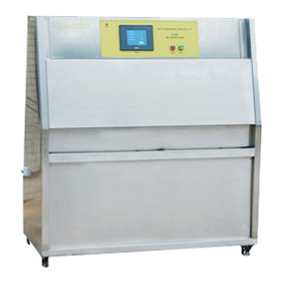How UV aging chamber simulates moisture
The UV weathering chamber reproduces the damage produced by sunlight, rain and dew. The equipment performs the test by exposing the material to be tested to a controlled interactive cycle of sunlight and moisture while raising the temperature. The equipment uses UV fluorescent lamps to simulate sunlight, and can also be condensation or spraying to simulate the effect of moisture. It is the test equipment for aviation, automobile, home appliance, scientific research, etc. It is suitable for schools, factories, military industry, research institutes, etc.
When materials are placed outdoors, they are statistically subjected to frequent moisture effects for at least 12h per day. One of the main advantages of the UV aging chamber is that it can simulate the damage to the material in accordance with the actual outdoor humidity environment.
In such a condensation cycle, the water tank at the bottom of the chamber is heated to produce steam. Because most of this moisture is in the form of condensation, the aging chamber uses a special condensation principle to mimic outdoor moisture in accelerated artificial climate aging tests.
The cooling effect of the indoor air causes the temperature of the tested test surface to decrease by a few degrees compared to the steam temperature. This temperature difference of a few degrees allows the water to continuously descend to the tested surface during the condensation cycle. Hot steam to maintain the environment of the test chamber at high temperatures with relative humidity. Test aging chamber design, to make the test The plate actually forms the side wall of the test chamber. This exposes the back side of the test panel to room temperature room air.

Because materials are generally exposed to moisture outdoors for a long period of time, a typical recirculating condensation system should have a minimum test time of 4h. The condensate so produced is stable and pure distilled water. This water improves the reproducibility of experimental results, eliminates the problem of water sediment contamination and simplifies test equipment installation and operation. Installation and operation of the test equipment.
The long, heated condensation cycle is more effective in reproducing the damage to materials from humid environments than other methods such as water spray, impregnation and other high humidity environments. When the aging chamber condensation process is conducted under heated conditions, it greatly accelerates the rate of moisture damage to materials.
UV aging chamber simulates moisture workflow.
The vast majority of outdoor humidity is caused by dew, not rain. Therefore, UV uses a unique condensation mechanism to simulate outdoor humidity. In the UV condensation cycle, the water in the reservoir at the bottom of the test chamber is heated to produce hot vapor that fills the chamber and maintains the relative The design of the UV ensures that the sample being tested actually forms the side wall of the test chamber so that the back side of the sample is exposed to the ambient room air. The room air behind (outside) the sample has a cooling effect, causing the surface temperature of the specimen to drop to a level several degrees below the vapor temperature. vapor temperature by a few degrees. This temperature difference results in the presence of liquid water condensed on the surface of the specimen throughout the condensation cycle.
The UV condensation cycle typically lasts several hours because outdoor exposure to moisture can grow to more than ten hours per day. All UV models are equipped with this condensation system. For some applications, a water spray can better simulate the environmental conditions of the end use. Water spray is useful in simulating The UV/spray models are equipped with a condensation and water spray system. The shower system has 12 nozzles, 6 on each side of the test chamber. The water spray system can be operated for a few minutes and then shut down. This short period of water jets quickly cool the sample and create thermal shock conditions. Alternatively, the water jets can be run for several hours to create a mechanical erosion effect by mimicking the scouring action of rain. This has been found to be particularly useful for wood coatings.
2021-11-11 11:00
